In this article, we will define some of the most important bookkeeping terminology that every business owner should know. If you know what these terms mean, you’ll have a much easier time navigating financial documents and making sound business decisions.
Having a firm knowledge of bookkeeping principles and terminology is essential for the successful operation of any size organization. Learning the lingo of bookkeeping will help you manage your company’s finances more efficiently and make better judgments. In this article, we’ll go over some of the most important bookkeeping words that each business owner needs to know.
Assets: Cash, inventory, equipment, and accounts receivable are all examples of assets that a business may have. The financial well-being of a company can be gauged by knowing its asset worth.
Liabilities: To put it simply, liabilities are the monetary commitments that your company has made to third parties but has yet to receive payment for. In order to effectively manage your cash flow and debts, you must have a firm grasp of your liabilities.
Sales: Sales are the money your company makes from its main activities. Income from sales, fees for services, or other means is included. Keeping tabs on your revenue is a good way to gauge your company’s success.
Expenses: Include things like rent, utilities, employees, and supplies that you have to pay for in order to keep your business going. Keeping tabs on costs lets you evaluate your profitability and make fine-tuned decisions.
Accounts Payable: A company’s accounts payable are the sums it owes to vendors and suppliers for products and services that have been delivered but not yet paid for. Maintaining good ties with your suppliers depends on efficient administration of accounts payable.
Accounts Receivable: These are the amounts owing to your company by clients or customers for products or services given on credit. Maintaining a constant cash flow is possible with properly managed accounts receivable.
Cash Flow: Money coming into and going out of your company is known as “cash flow.” If you want to have enough money to pay bills, fulfill commitments, and make smart investments, you need to keep tabs on your cash flow.
Balance Sheet: The assets, liabilities, and equity of your company can be summed up in a single document called a balance sheet, which is a type of financial statement. It can be used to monitor the development of your company and provide insight into its financial health.
Profit and Loss Statement (Income Statement): Your company’s income (or loss) for a given time period can be summarized in a document called a profit and loss statement. It’s a useful tool for assessing how well your firm is doing financially and pinpointing possibilities for growth.
Equity: After deducting all debts from a company’s assets, the remaining amount is the owner’s equity. The capital may come from the company itself, its shareholders, or a combination of the three. You can better assess your company’s worth by getting to know its equity.
Small business owners who care about their financial security and who want to make good judgments should become fluent in the language of bookkeeping. Learning these concepts will provide you the assurance you need to efficiently handle your company’s financial records, monitor its progress, and prepare for its future growth.
Keep in mind that proper bookkeeping is the bedrock of any well-run enterprise. Our skilled staff is always available to lend a hand with your bookkeeping needs.

